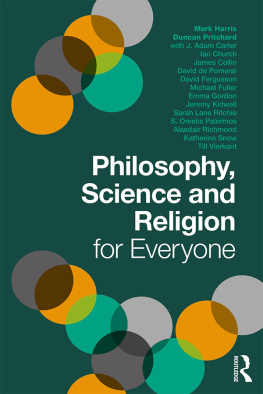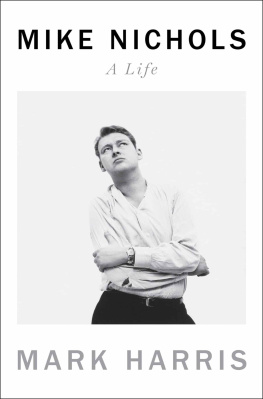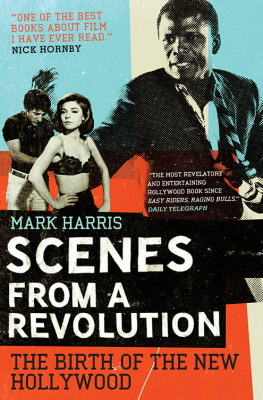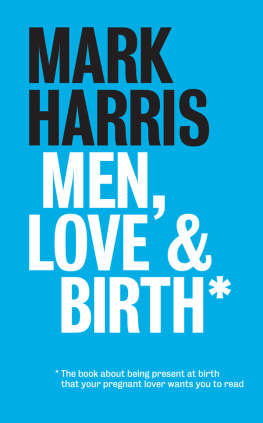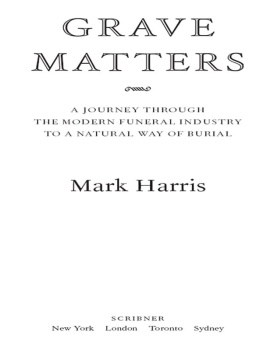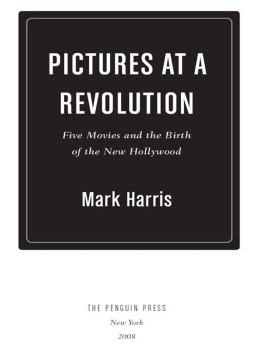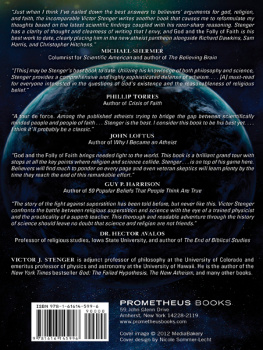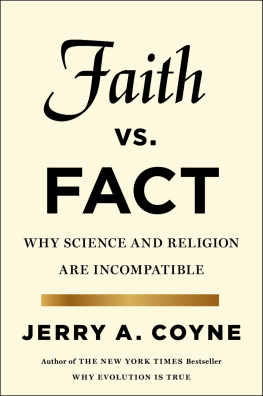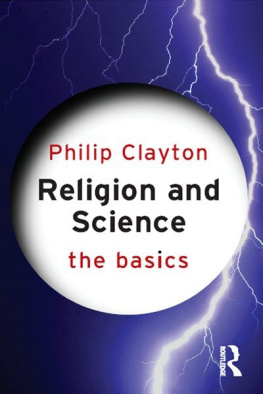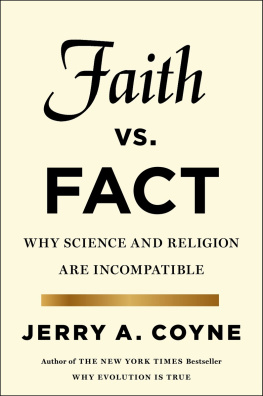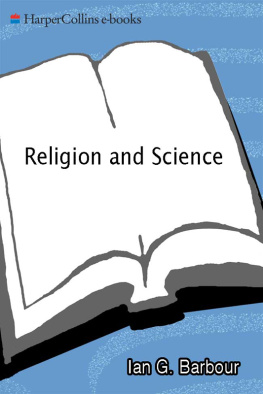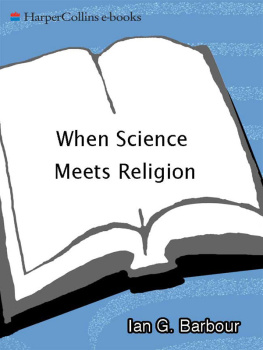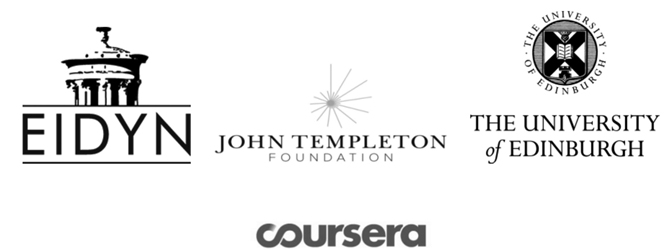This book is designed to be used in conjunction with the free Philosophy, Science and Religion MOOC (massive open online course) created by the University of Edinburgh and hosted by the Coursera platform (www.coursera.org). This book is also highly recommended for anyone looking for a concise overview of this fascinating discipline.
Philosophy, Science and Religion
Free Online Course Series
This completely free and open online course series introduces you to some of the main debates at the intersection of philosophy, science, and religion, and is designed to be used in conjunction with Philosophy, Science and Religion for Everyone. Each week a distinguished guest lecturer talks you through some of the most important questions and issues in their area of expertise. The series is split into three courses: Science and Philosophy, Philosophy and Religion, and Religion and Science, each of which is introduced by instructors from the University of Edinburgh. No prior knowledge is required. Students who successfully complete the course are eligible for a certificate from the University of Edinburgh.
This Massive Open Online Course (MOOC) series has been created by the University of Edinburghs Eidyn research centre (www.eidyn.org), thanks to generous support from the John Templeton Foundation, and is offered by Coursera.
Watch an introductory video and sign up for the courses at: www.coursera.org/learn/philosophy-science-religion-1
Taught by Dr J. Adam Carter, Dr Mark Harris, Dr S. Orestis Palermos, Prof Duncan Pritchard, Dr Mog Stapleton, Dr James Collin
Prof Martin Kusch, Prof Tom McLeish, Prof Michael Murray, Prof Conor Cunningham, Prof Stathis Psilos, Prof John Schellenberg, Prof Justin Barrett, Prof John Greco, Dr Rik Peels, Prof John Evans, Prof Mark Alfano, Prof Tim Maudlin, Prof Al Mele, Dr Kevin Scharp, Prof David Clough, Prof Simon Conway Morris, Prof Michela Massimi, Dr Bethany Sollereder, and Prof Graham Priest.
Philosophy, Science and Religion for Everyone
Edited by Mark Harris and Duncan Pritchard
First published 2018
by Routledge
2 Park Square, Milton Park, Abingdon, Oxon OX14 4RN
and by Routledge
711 Third Avenue, New York, NY 10017
Routledge is an imprint of the Taylor & Francis Group, an informa business
2018 Mark Harris, Duncan Pritchard with J. Adam Carter, Ian Church, James Collin, David de Pomerai, Michael Fuller, David Fergusson, Emma Gordon, Jeremy Kidwell, Sarah Lane Ritchie, S. Orestis Palermos, Alasdair Richmond, Katherine Snow, and Till Vierkant
The right of Mark Harris and Duncan Pritchard to be identified as the authors of the editorial material, and of the authors for their individual chapters, has been asserted in accordance with sections 77 and 78 of the Copyright, Designs and Patents Act 1988.
All rights reserved. No part of this book may be reprinted or reproduced or utilised in any form or by any electronic, mechanical, or other means, now known or hereafter invented, including photocopying and recording, or in any information storage or retrieval system, without permission in writing from the publishers.
Trademark notice: Product or corporate names may be trademarks or registered trademarks, and are used only for identification and explanation without intent to infringe.
British Library Cataloguing-in-Publication Data
A catalogue record for this book is available from the British Library
Library of Congress Cataloging-in-Publication Data
A catalog record has been requested
ISBN: 978-1-138-23415-4 (hbk)
ISBN: 978-1-138-23421-5 (pbk)
ISBN: 978-1-315-10247-4 (ebk)
Typeset in Times New Roman
by Apex CoVantage, LLC
Contents
MARK HARRIS AND DUNCAN PRITCHARD
S. ORESTIS PALERMOS AND DUNCAN PRITCHARD
MARK HARRIS
DAVID DE POMERAI AND MARK HARRIS
ALASDAIR RICHMOND
DUNCAN PRITCHARD
IAN M. CHURCH
SARAH LANE RITCHIE
J. ADAM CARTER
EMMA GORDON
MICHAEL FULLER
DAVID FERGUSSON AND KATHERINE SNOW
JAMES COLLIN
TILLMAN VIERKANT
JEREMY H. KIDWELL
Guide
Mark Harris and Duncan Pritchard
The science-and-religion discourse is so significant that its hardly possible to live in the Western world and not hold an opinion on it. The discourse is, however, almost universally construed in terms of a debate, and a debate thats characterised by conflict above all. The fact that the discourse underlies some highly volatile social and political disagreements adds fuel to the fire (and these disagreements are especially live in North America, especially concerning climate change, the place of evolution versus creation in high school education, and in bioethics concerning pro-life versus pro-choice). Arguably, theres too much heat and little light in these disagreements. Adding philosophy to the mix (Philosophy, Science, and Religion), this book takes the view that the science-and-religion debate can move beyond hostility to become a major force behind a new kind of intellectual enlightenment in modern culture.
At present, its possible to see the science-and-religion debate as a near-perfect example of C. P. Snows famous Two Cultures idea, that theres an intellectual gulf between the natural sciences and humanities subjects so deep that meaningful dialogue is almost impossible. We are all too familiar with the many inexpert and over-confident commentators on both sides of the science-and-religion divide who weigh in blithely, with the effect that all too often the misunderstanding and hostility are entrenched due to a poor grasp of the issues at stake. The new atheism debate and the creation versus evolution debate are good examples of areas dominated by clashes of ideologies rather than the productive exchange of ideas. As a result, the conflict hypothesis that science and religion are irreconcilably at war with each other looks set to be perpetuated indefinitely. And yet, the academic discipline of philosophy, science, and religion, which brings together thousands of scientists, philosophers, historians, and theologians (among other kinds of scholars), has demonstrated again and again the superficiality of the view that science and religion have to be completely at loggerheads.

